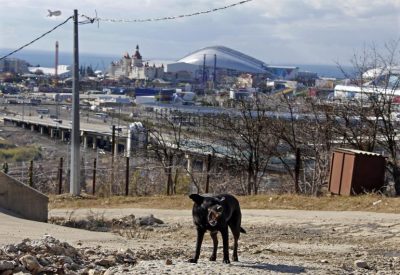By
Mitchell Krockmalnik Grabois
Stray Dogs
1.
The Winter Olympics at Sochi were going to be grand, filled with spectacle, celebrating Russia’s glorious past and its powerful and prosperous present, but first they had to kill the stray dogs. The dogs were normal strays, undistinguished mongrels, no meaner or more aggressive than strays anywhere, but they were hanging around the Olympic venues and the Olympics were going to be grand.
The strays lived where they could, looking for handouts from generous humans, whose collective unconscious held memories of the earliest days of their interspecies partnership. Dog and human had hunted together, worked and played together, but the Olympics were going to be truly magnificent.
A lot of old buildings had been torn down in Sochi, and the dogs found themselves without their long-time shelters. Now they were homeless and exposed. Their spaces were now public places. Russia’s Olympics were going to awe all the world’s nations.
So the government hired a pest control company, one that had eliminated raccoons and skunks and other unwanted varmints, even dangerous dogs, and the company drove through Sochi and picked up the strays, most of whom wagged their tails, not expecting betrayal and death. This Olympics was going to be the grandest ever, truly heroic in style and substance, but first they had to kill the stray dogs.
2.
Tu’s house was full of strays. I called her “a crazy dog lady.” She didn’t mind. Tu was a psychiatrist, but not my shrink. Not mine. We were colleagues. I was a professional in a profession I gave up so long ago, I can’t remember what it was.
Tu was famous, though no one knew. She was the little girl photographed running down the napalmed road, her skin melting, her face a mask of pain. But when people look at her these days, all they see is an anonymous Asian in black-framed glasses. They don’t know that napalm is still in her skin, threatening to combust. I love her for her sacrifice and unconditional acceptance. She is healing me with her heart.
I ink secret messages in the rubber of my black and white Keds. She reads them and understands, but pretends she hasn’t seen.
That night, Tu handed me a couple of pills. For your malaria, she said. I’ve never had malaria, but I took them as a show of trust. Later we went for a walk in the woods. Suddenly we were in a thunderstorm, drenched to the skin. Lightning flashed and a bolt hit a tree not fifty feet away. I heard the dogs of Sochi howl. I heard Tu’s dogs whimper. We screamed and dropped into a ditch. The water flowed under and around us and reflected the flashes of lightning that lit the varicose sky. The mud was orange ointment and, when I peeled off Tu’s clothing, her molten blue flesh hissed like serpents.



No Comments Yet!
You can be first to comment this post!